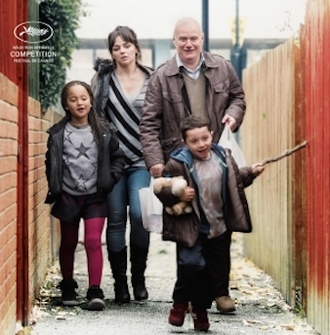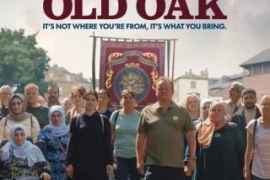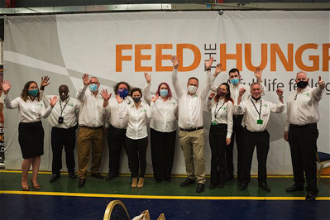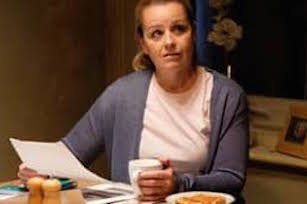Film: I Daniel Blake

Scene from 'I Daniel Blake'
This evening, Saturday 5 January, Ken Loach's award-winning film I, Daniel Blake will shown on BBC Two at 9.45pm. The film will be later be available on iplayer. First screened in cinemas in 2016, this movie is a searing indictment of the impact of recent UK government policy on real lives. It charts the story of two people caught in the nightmare of the benefits system. (The bureaucracy has become even more complicated since this film was made).
Set in Newcastle, upon Tyne, the film follows 59-year-old carpenter Daniel Blake (Dave Johns) who is forced to apply for benefits for the first time in his life after suffering a severe heart attack. To get financial support he first needs to go through a 'work capability test' His application for Employment Support Allowance (ESA) is rejected because he can walk a short distance and raise two hands above his head. The 'health care advisor' refuses to look at his medical notes, sticks to her script; refuses to acknowledge the impact of his certified medical condition. "Can I ask you a question?" Daniel asks, "Are you medically qualified?"
In April 2018, the Mirror reported that 68% of people who appealed against an assessment decision had it overturned by a tribunal. In order to appeal, Daniel is told that he must apply online. Having worked as a carpenter all his life, Daniel has never used a computer.
Meanwhile, he's placed on Jobseeker's Allowance. To receive this, Daniel must actively look for work, although his doctor has advised him he can't work until he's well enough. And so the spiral begins.
Daniel meets Katie Morgan (Hayley Squires), a single mother of two at the Jobcentre. She has been sanctioned because she signed on late, so Daniel steps in to offer moral support. After two years in temporary accommodation in London, Kate has just been moved 300 miles away to Newcastle - far from her family and friends.
On one level, the film narrates the beautiful friendship that develops between Katie and Daniel as they battle to survive. On another, it's a stark and brutal testimony documenting the reality of life on benefits under the Conservative government.
Loach and Scottish writer Paul Laverty, who've worked together for 20 years, researched meticulously for six months before making the film. They visited foodbanks and jobcentres and spoke with countless people living under the same conditions as Daniel and Katie. As Loach said: "We met so many people who had been humiliated and destroyed and lost all sense of being able to hold their own in the world."
The issues covered this film haven't gone away. In November 2018, Philip Alston, UN special rapporteur on extreme poverty and human rights, concluded an investigation into the impact of austerity and rising levels of poverty in the UK.
The report states: "14 million people, a fifth of the population, live in poverty. Four million of these are more than 50% below the poverty line, and 1.5 million are destitute, unable to afford basic essentials. The widely respected Institute for Fiscal Studies predicts a 7% rise in child poverty between 2015 and 2022, and various sources predict child poverty rates of as high as 40%."
Left with no income, Katie - like too many parents in 2019 - struggles to feed her children. Daniel goes with her to a foodbank. This scene was filmed in the same church where Newcastle's real West End Foodbank helped more than 46,000 people in 2018 alone - a year when foodbank use in the UK rose by 13%.
Between April 2017 and March 2018, Trussell Trust foodbanks distributed over a million (1,332,952) three-day emergency food packages. And as the charity says: "484,026 of these went to children." A further 801 independent food banks around the country also distributed food. Many food bank clients have jobs - but their earnings often on 'zero hours contracts' are so low and rents so high - they aren't enough to live on.
Of all film directors, Ken Loach, now 80, is the one who has received the most awards from Catholic and Ecumenical juries around the world, including this film. Invited to Cannes in 2004 to receive a lifetime award from the churches, he attended, gave a speech of appreciation, saying that he grew up with an image the Catholic Church as a monolith but, over the years that has changed, especially because of his long collaboration with Paul Laverty, who spent a number of years at the Scots seminary in Rome, and writes all Loach's screenplays.
A social campaigner for most of his career, Loach believes the current criteria for claiming benefits in the UK are "a Kafka-esque, Catch 22 situation designed to frustrate and humiliate the claimant to such an extent that they drop out of the system and stop pursuing their right to ask for support if necessary."
His earlier films include Poor Cow, (1967) which looks at poverty, Cathy Come Home, (1966) a study on homelessness and Riff-Raff, (1991) and The Navigators, (2001) that deal with employment.
Loach's film Kes (1969) was voted the seventh greatest British film of the 20th century in a poll by the British Film Institute. Two of his films, The Wind That Shakes the Barley (2006) and this one - I, Daniel Blake (2016) received the Palme d'Or at the Cannes Film Festival, making him the ninth filmmaker to win the award twice.
Watch a trailer for I Daniel Blake: www.youtube.com/watch?v=ahWgxw9E_h4


















